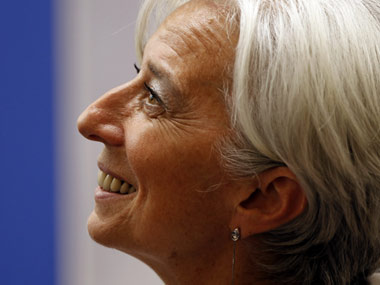So, the “old boys” club of heavyweight powers has stuck to the form book and named another European as head of the International Monetary Fund (IMF). Only this time, they’ve had to amend their “jobs for the boys” rule to give it to Christine Lagarde, the suave French Finance Minister who once complained that there was “too much testosterone” in financial circles.
Lagarde shouldn’t complain: in many ways, she owes her election to a gush of male hormones that landed IMF’s former managing director Dominique Strauss-Kahn in a scandalous case of sexual assault on a hotel maid in New York- and created a vacancy ahead of its time.
Although Strauss-Kahn was to have stepped down in the normal course soon enough- he was to contest France’s presidential elections - his premature ejection meant that the time-frame for his successor’s election as IMF chief had to be advanced. In the end, it was that abridged time-frame that helped Lagarde, who uncharacteristically faced a challenge to her candidacy, secure the top job.
[caption id=“attachment_33505” align=“alignleft” width=“380” caption=“In many ways, Lagarde owes her election to a gush of male hormones that landed IMF’s former managing director Dominique Strauss-Kahn in a scandalous case of sexual assault.Charles Platiau/Reuters”]  [/caption]
Yet, for all the ease of Lagarde’s victory, she could well be IMF’s last European Empress.
That’s because the old Empires of the West are crumbling, and nowhere faster than in Europe. The very future of the eurozone as a single-currency union is now in serious doubt , with Greece threatening to drag even the core European economies down the drain.
In fact, in the run-up to Lagarde’s election, a persuasive case had been made for why - despite Lagarde’s many merits as a financial professional with considerable charm - the next IMF head should not be drawn from Europe. The cosy arrangement under which the top job at the World Bank went to an American and the head of the IMF was drawn from Europe reflects a power equation that may have been valid in the post-Second World War era, but is a complete anachronism today.
Impact Shorts
More ShortsThe rise of emerging economies, particularly China and India, at a time when the developed economies of the West are in demonstrable decline, has shaken up the old-world power system. And although these emerging powers still have miles to go before they can project power and truly claim to have tilted the axis to their advantage, it is a statistical inevitability that they will cast a long shadow.
This time around, it’s fair to say, the emerging economies, perhaps thrown off-guard by the circumstances surrounding Strauss-Kahn’s abrupt exit, didn’t quite seize the moment and the opportunity created by it. Although several names from among developing economies were bandied about as worthy candidates to head the IMF - here , here and here - these economies weren’t quite ready to believe that their time had come.
That lack of conviction in their own destiny manifested itself in rent-seeking behaviour: striking deals with powers and working to shape a consensus that favoured the “old boys’ network”. In the absence of complete trust among the bigger economies - particularly China and India - about their strategy, there was never anything close to a serious candidate from within their ranks.
But next time, it will be different. There’s a certain hormonal rush induced by the rise of the emerging economies that definitively says that the arc of history will be bent decisively in their favour.


)

)
)
)
)
)
)
)
)



